When people think of the term ‘Meal Prepping’ they tend to think of extreme diets, there is probably a mental image of a fridge/freezer full to the brim with containers covering every meal one will consume for the next week. That extreme image is not a true reflection of what meal prepping is, meal prepping can be a great tool you can use to help improve your day-to-day life in many ways and aid you in reaching your fitness and health related goals. In this article, we will discuss the benefits of meal prepping and give you some tips you can apply to help you in your meal prepping journey.
What is Meal Prepping?
In essence, it is a term used to describe the process of preparing and portioning out multiple meals in advance, usually for the upcoming week. The phrase itself originated from fitness and bodybuilding communities, where there was great importance placed on diet and nutrition because of their competitive sports and performance related endeavours. As trends in healthy eating and fitness became more mainstream, the term meal prepping became more common place to describe a variety of practices related to preparing food in advance for a variety of purposes and audiences.
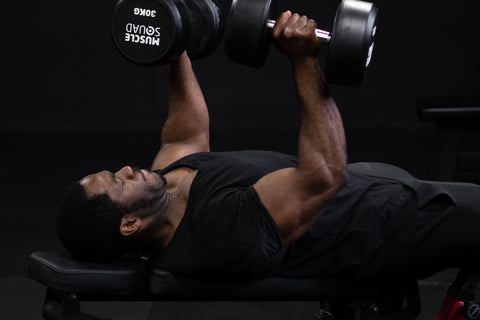
What are the benefits of meal prepping?
Save time
Meal prepping can save time during the week by eliminating the time you would have to spend preparing a meal each evening. Let us quantify it, say you spend 2 hours on Sunday preparing two meal variations. 45 minutes preparing a chicken curry with rice, another 45 minutes preparing some steamed vegetables with steak and 30 minutes to clean the dishes. We will assume you are preparing for a single person, two portions of each meal so you can switch between the two for variety, chicken curry Monday and Wednesday, steak with vegetables Tuesday and Thursday.
For the next 4 days, normally you would have to prepare and cook your meal each evening, then wash up afterwards. Which, if you are fast, will take roughly an hour. This hour per day has been reduced to 3-5 minutes of heating up your food in a microwave and a few minutes spent cleaning your container. By spending those 2 hours on the Sunday, you cut your total time spent preparing food in half. 1 hour per day for 4 days (4 hours total) down to only 2 hours labour. Those two hours of labour can be quantified even further if you compare that to your hourly salary or opportunity cost in terms of other things you could be doing with those two hours.
Makes eating healthy easier
By preparing your meals in advance, you can plan and choose what you are going to eat throughout the week. This can make it significantly easier to make healthier choices. When you have prepared dinner in the fridge that is ready to eat, it will greatly reduce the temptation of ordering out or leaving your house to go get ‘junk’ food. Normally you would come home from work and must actively make the choice to eat healthy by preparing your meal that evening, however, by meal prepping you proactively make the healthier decision for yourself days in advance.

Financial savings
Purchasing food in bulk will save you a lot of costs in comparison to purchasing food to cook on a day-to-day basis. Meal prepping will help reduce the frequency you would normally order takeaway and eat out etc. Even utility bills costs, cooking 1-2 times per week in bulk is much more efficient in terms of energy consumption than cooking every day.
Reduces decision fatigue
Having your meals planned each week means that you will not need to decide what you are going to eat, how you will prepare it etc. In turn, reducing a huge amount decision fatigue that can occur throughout the day. Your grocery shopping trips can be streamlined, since you have planned what you are going to eat, you can go in with a specific list of items you need to purchase, which again reduces the number of decisions you must make in the grocery store.
Allows you to track your macro and micronutrients
When you order takeaway or go out to eat at a restaurant, it is extremely difficult to know exactly how many calories you are consuming, how much protein, fats, vitamins etc. Over recent years, legislation has been put in place to make this information more accessible and clearer to consumers, however, the numbers are not accurate and portion sizes can vary. If you are trying to build muscle, not getting enough protein can be the difference between gaining muscle and losing it. By meal prepping you get to see all the raw foods you are consuming and can accuratley track all your nutrient intake to ensure you are meeting your personal goals and health requirements.
If you are unsure about how many calories you should be eating, here is a link to a base metabolic rate calculator: https://www.diabetes.co.uk/bmr-calculator.html
Using this tool you can plug in your weight, height, age etc and get a rough estimate for how many calories your body burns throughout the day. From there you can use this to plan your goals, if you want to build muscle, you will need to eat in a calorie surplus with sufficient protein, if you want to lose fat, you need to eat in a deficit to burn the fat. 1lb of fat is equivalent to approx. 3500 calories, so a 300-calorie deficit per day will result in approx. half a pound of fat burned per week.
Tips for meal prepping
You do not need to overdo it
When meal prepping you do not have to prepare every single meal you are going to eat for the next 7 days, you can keep it simple and only prepare your dinners for the next 3-5 days. If you are the type of person that can eat the same foods for multiple days in a row, then make life easy for yourself and just batch prepare one meal.
My personal go to is chicken thighs, sweet potatoes and broccoli, all oven cooked to save on preparation time, and I always prepare 4 meals worth on a Sunday (takes about 2 hours) and that provides me my dinners for Mon-Thurs. For breakfasts I keep it simple and have instant porridge with some honey drizzled for those 4 days. For the rest of my meals during these days, I will grab a sandwich meal deal from the shops, or maybe get a ready meal and ‘freestyle it’. The key thing is that my main meals for the day have been accounted for and I fill in the rest.
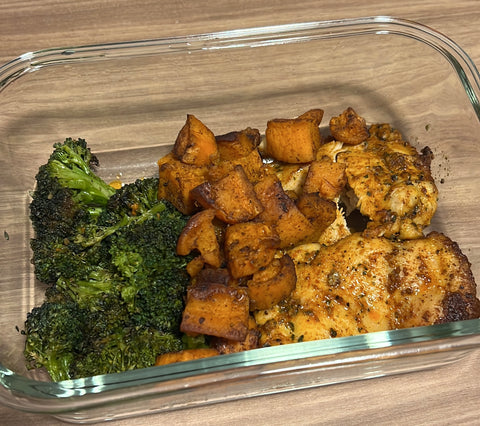
Make sure you enjoy your food
As human beings we take great pleasure in consuming food, we have reached the stage where we do not only eat for survival but eat for how it makes us feel. There is no point preparing foods that you do not like and will have to force yourself to eat. Make sure to prepare food that you will be able to somewhat enjoy eating. It would be unrealistic to say you should enjoy your food as much as you would enjoy eating at a restaurant or fast-food takeaway. But, if you were to put it on a scale and you have two options pleasurable or not pleasurable, ideally you want the food you prepare for yourself to be on the pleasurable spectrum.
If you need inspiration take to the internet, there is a plethora of recipes, meal plans etc that you can refer to, which can help you find new ways to prepare healthy food. You will not need to sacrifice eating your favourite foods either, go to the search bar and type any meal and add ‘healthy version’, ‘low-calorie’ or ‘high protein’ to the end and you will find a whole host of videos showing you how to make those variations of your favourite dishes.
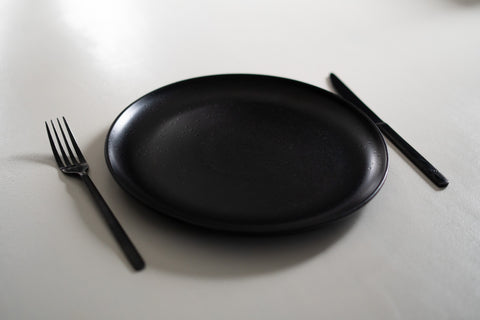
Figure out your goals
Meal prepping can be a great tool to reach your goals, but you need to define what those goals are to construct the best plan and maximise the benefits of your time spent preparing meals in the kitchen.
Are you trying to build muscle? Then you will need a high protein diet to optimise for muscle building protein synthesis. Trying to lose fat? You may want to swap out your high calorie meals or lower calorie high volume foods to keep you full while you are in calorie deficit. Are you a competing in a sport like football or cycling where your endurance is pushed and there are high volumes of cardiovascular work? You may need to ensure you are consuming enough carbohydrates to keep up with the energy demands. These are just some generic examples, please consult a qualified professional for specific dietary advice.
Be flexible
When meal prepping, you do not have to be extremely strict and confine yourself to a narrow path. If you are a person that may make spontaneous plans and likes to eat out, you can plan for this by making your meals flexible. I will use myself as an example, alongside my cooked meal prep I tend to plan foods that do not have an immediate expiry i.e., instant porridge packs, protein bars. This means if I want to go out for lunch or dinner with a friend one day, I can skip the protein bars and porridge to give me the calorie allowance to go out for a bite to eat without going over my daily calorie goal.

Another way you can be flexible is by only preparing 1000 calories worth of food per day and leave the other 1000-1500 calories for your lunch out with co-workers or potential takeaway you may order later in the evening etc. It takes a little bit of foresight and planning but by doing this, you will not have to confine yourself to only eating prepared meals while still gaining the benefits of meal prepping.
Do not over complicate it
You do not have to be extremely fancy with your meal prep, you are not competing with anyone, and you should not really be concerned with what other people think about your meals. You may look online and see people making all sorts of fancy meals, if cooking is not your forte, then keep it simple and stick to what you prefer to cook and eat. Your priority should be finding the healthiest meals that you enjoy and are the most convenient for you to prepare.
'My Fitness Pal' and apps alike are your best friends
Apps like ‘my fitness pal’, allow you to plan your meals and program your meals with ease. I personally stopped using shopping lists and refer to ‘my fitness pal’ when I do my weekly shop as I pre-fill out the foods I plan to eat in the days ahead.
Let us say you plan to cook some spaghetti Bolognese, you can enter all the ingredients into my fitness pal, 250g mince beef, 400g pasta, 300g tomato sauce etc (ignore the ratios) and all your other ingredients, then when you portion it out into 3 containers for example for 3 days’ worth of meals, you just enter one third of your spaghetti Bolognese recipe into the ‘my fitness pal’ diary. Now in two weeks’ time when you decide to cook this dish again your meal is still saved from the previous time, so now you can enter one third of spaghetti Bolognese dish or even a quarter if you are going for smaller portion. Eventually, you will have all your regular meals programmed in, so you will not need to scan new items or re-enter dishes. This makes tracking your calories and nutrient intake extremely easy and effortless.
Summary
Meal prepping can be a tool that can make a huge impact in your life, freeing up your time, saving you money and allowing you to tailor your diet to reach whatever fitness goals you may have. Remember that you have your own goals and unique lifestyle, so the goal is not to copy someone else’s formula but to develop your own to help optimise your day-to-day life and reach those goals.

 Feb 17, 2023 - JY Sharif
Feb 17, 2023 - JY Sharif
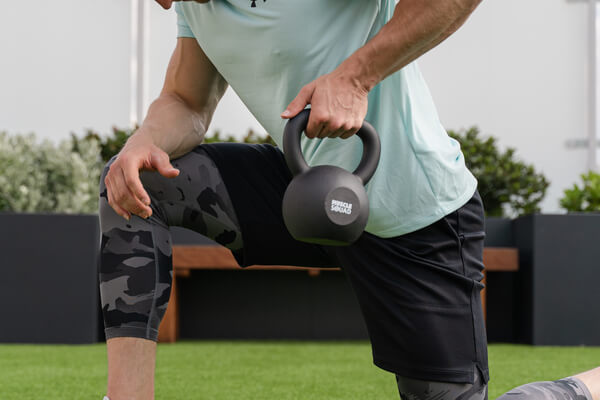
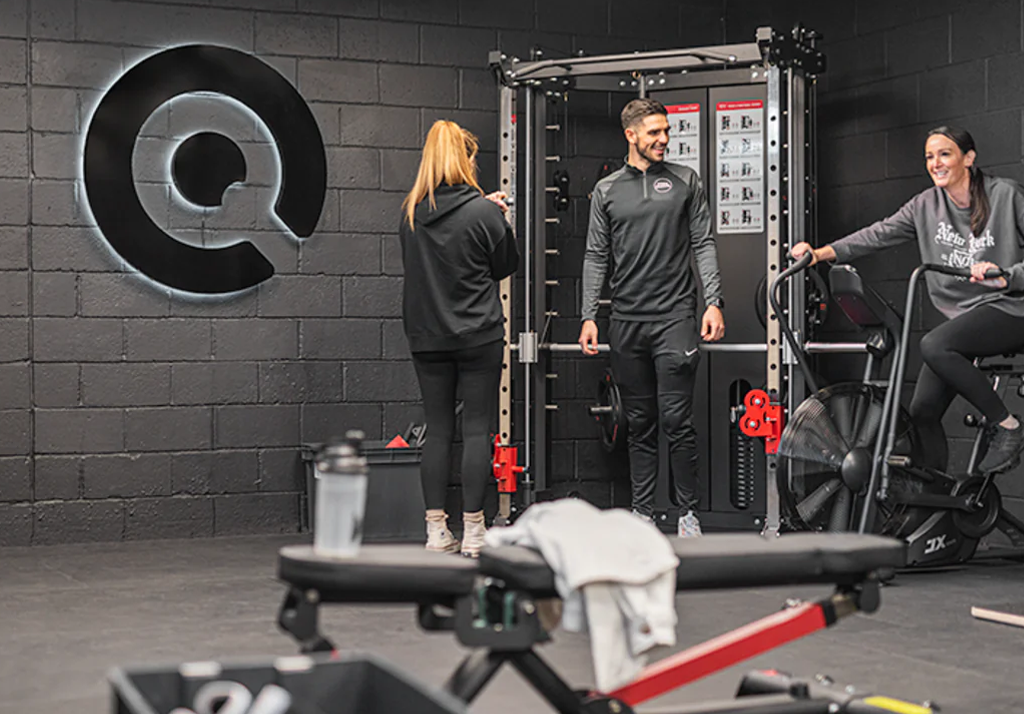
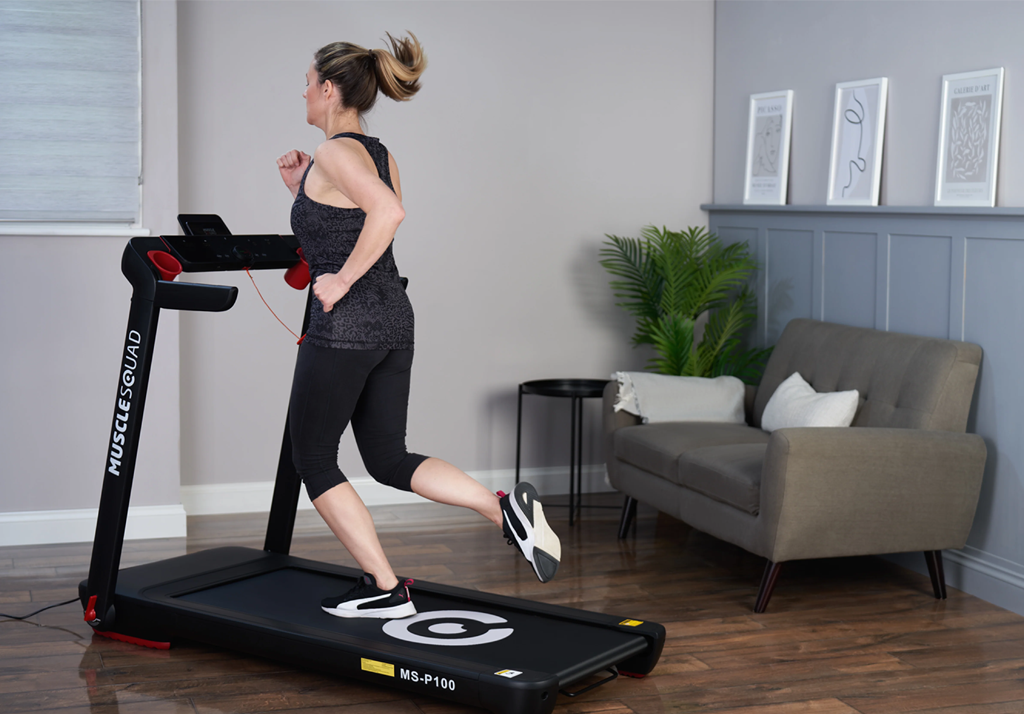
Leave a comment: